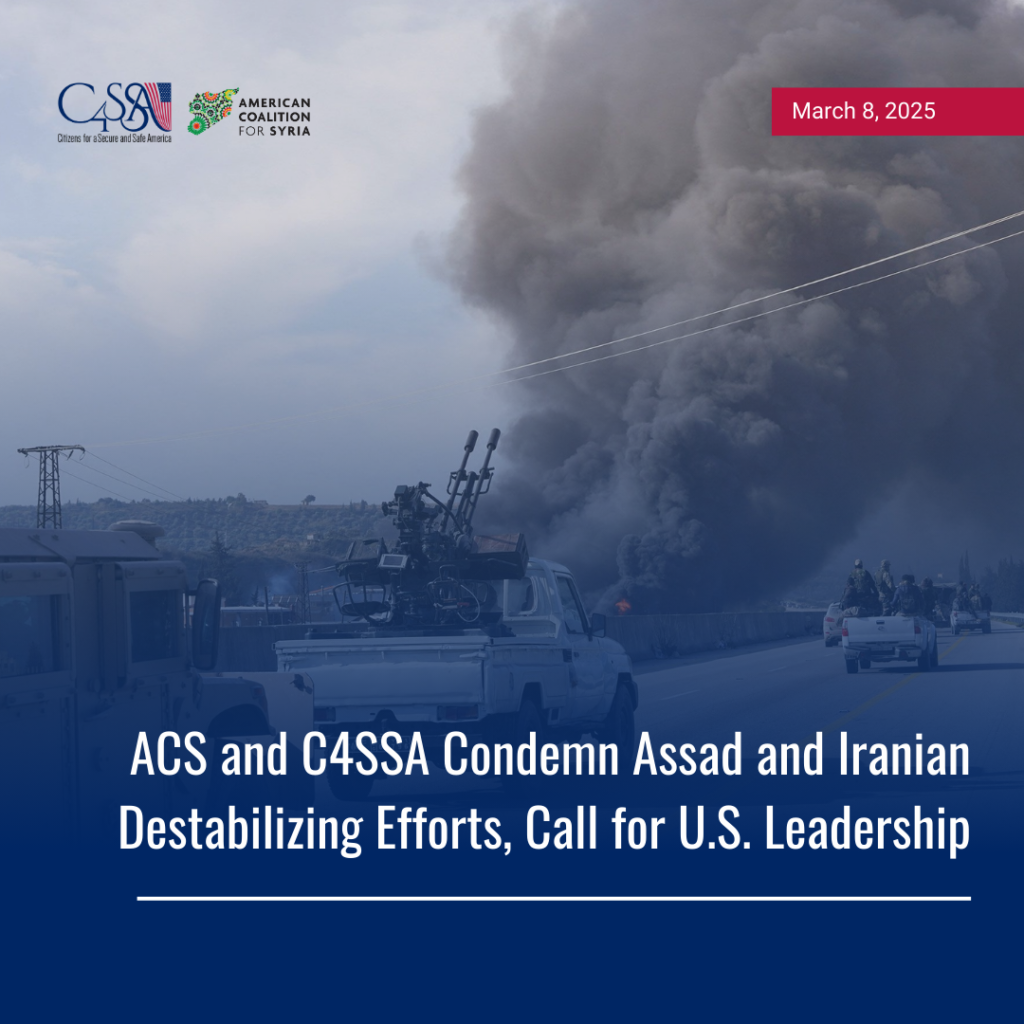WASHINGTON, D.C. — The American Coalition for Syria (ACS) and Citizens for a Secure and Safe America (C4SSA) strongly condemn the coordinated attacks and crimes carried out by armed pro-Assad loyalists across the provinces of Latakia and Tartous. These attacks, which targeted police and security forces, civilian centers, and hospitals, have resulted in significant casualties among both Syrian security forces and innocent civilians.
We also lament and strongly condemn the loss of innocent civilian lives in this violence, and we acknowledge the violations committed by some former rebel groups in response. President Ahmad al-Sharaa himself has recognized these abuses, pledging that perpetrators will be held accountable and that military actions must adhere to national laws and ethical standards. There can be no justice or stability in Syria without accountability at all levels. ACS and C4SSA also condemn the deliberate use of misinformation and sectarian rhetoric to fuel instability and division. These events underscore the urgent need for transitional justice processes to begin, in order to begin addressing deep societal wounds.
Over the past 48 hours, armed groups linked to remnants of the former Assad regime, supported by Iran, have engaged in violent attacks, notably in Latakia province, in what appears to be a deliberate effort to destabilize the country and flame sectarian tensions. The attacks highlight the fragile security situation in the country and the increasing potential for foreign actors to exploit the turmoil in Syria for their own strategic interests. If left unchecked, these developments could further destabilize Syria and the region and embolden Russia and Iran to re-expand their presence and influence. Many war-weary Syrians are afraid that these developments could also drag the country back into civil war.
In this critical moment, we recognize and appreciate the strong statements of support from numerous regional states, all of whom have expressed their commitment to Syria’s stability and the necessity of unified security efforts. These nations understand that a fractured Syria is a dangerous Syria—not just for Syrians, but for the entire region.
Yet, as the transitional government fights to secure the country and lay the foundations for a just and peaceful Syria, it faces an immense structural challenge: the world’s most restrictive sanctions regime, which severely hampers its ability to govern effectively. This has led to three critical failures that must be urgently addressed:
- Accountability for Assad-Era War Criminals: Without intelligence, policing, a legal framework for transitional justice, and judicial capacity, all of which requires funding, Syria cannot effectively track, arrest, and prosecute those responsible for past atrocities. Justice remains out of reach due to the challenges the government faces.
- Demilitarization and Economic Recovery: The transition requires reintegrating young men into society and providing them with economic alternatives to armed groups. It requires disarming non-state actors and asserting control over all rebel factions and establishing discipline and clear command structures. Yet, with no jobs, precarious control over certain armed factions, and little funding for structured demobilization programs, the conditions for renewed violence remain.
- Holding All Militant Forces Accountable: The violations committed against civilians by populists military forces and previous “Syrian National Army SNA” elements and others must be addressed. Without the institutional resources to assert control and investigate and prosecute wrongdoing, the risk of unchecked abuses persists. Stability cannot be built on impunity.
In a matter of three months, the transitional government has faced the daunting task of unifying Syria’s fractured militias—each with different backgrounds and allegiances—under a single command structure. Doing so while operating under one of the heaviest sanctions regimes in the world and with empty state coffers makes it nearly impossible. A Syria that remains economically broken and socially fractured is a Syria doomed to continued cycles of conflict—and that benefits no one.
We call on the United States government to join regional allies in supporting Syria’s transition by:
- Publicly condemning this violent attempt to destabilize Syria and further harm its people,
- Continuing and expanding the U.S. ongoing intel-sharing with Syria to help the transitional government anticipate and prevent further attacks to achieve stability,
- Ensuring that U.S. policy remains aligned with the goal of a stable, sovereign, and peaceful Syria, free from Assad-era militias and foreign intervention.
- Lifting the sanctions hindering Syria’s path to recovery and stabilization and restoring its foreign assistance to allow its institutions to rebuild and provide essential services key to maintaining stability.
The tensions in Syria have the ability to undermine Syrians’ efforts to lead Syria into peace and unity. Failure to act decisively at this critical juncture could have profound consequences not only for Syria but for U.S. immediate and long-term strategic interests in the Middle East. The time for stronger U.S. engagement is now.

